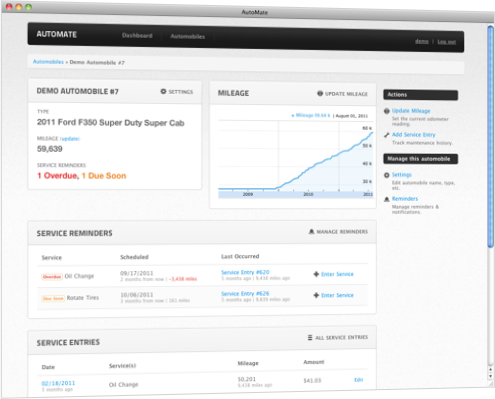
AutoMate is a new vehicle & fleet management solution that lets you keep your complete vehicle maintenance history in one place and be reminded when it’s the right time for the right service.
As part of this introduction, I’d like to give you some background on why I set out to build AutoMate, and what the fundamental goals are for the software.
Why Fleet Management?
I first became interested in vehicle management more from a personal standpoint. I always had trouble remembering what maintenance had been done to my truck & when it occurred. The oil change sticker on the windshield was my only maintenance reminder.
I’m also responsible for keeping track of the maintenance on my wife’s car, but I don’t drive it often and rarely think about it truth be told.
Needless to say, I knew this was not a good way to handle our expensive investments that we rely on every day - especially my truck that’s getting up there in mileage and needs more frequent attention.
So I started researching vehicle maintenance log solutions and didn’t find much other than an few simplistic iPhone apps, and some antiquated “installed” software applications that looked painful to use.
I also started to think about all the businesses that use vehicles as an important part of their operations, and figured if two vehicles are hard to manage, how are these businesses keeping track of 10, 50, 100+ vehicles? As I researched more and more, I found that many of the existing fleet management solutions were more focused on vehicle GPS tracking and somewhat lacking when it came to managing fleet maintenance history & schedules in a powerful, yet simple & elegant way.
So I started talking to different businesses that have vehicles to ask them how they manage their fleet.
I found that many businesses don’t keep track of their vehicles’ maintenance - and they knew that was a bad thing - but they hadn’t found a good way to do it.
Or some businesses use a tool like Excel to track their fleet maintenance, which is better than nothing. But it’s difficult to collaborate on an Excel document, and it can’t automatically remind you when it’s time for a particular maintenance - you have to manually open the file & look at it.
So I set out to build a better solution with some key principles in mind…
Fundamental Goals
- It must be easy to use. Many people at smaller companies take over the responsibility of managing the fleet, but it’s not their primary job. They have a million other things to do so their time spent managing the fleet should be quick & effective. You shouldn’t need a mechanic background to understand the software.
- It must be collaborative. Sure it may be one person’s responsibility to oversee the fleet, but there are a lot of other stakeholders when a business relies on their vehicles each day. The more everyone can stay informed and share the responsibility of managing the fleet, the longer the investment will last.
- It should go to where the users are. People are in their email all day — both at their desk and on their phones. A good fleet management system should go to where its users are to proactively remind them of maintenance & other things. It shouldn’t expect them to have to log in all the time to manage the fleet.
- It should be a repository for everything related to fleet maintenance. Invoices, receipts & other documents, as well as random notes should all be in one place, accessible everywhere. Finding the invoice for the timing belt replacement from 2 years ago shouldn’t take an hour rummaging through a file cabinet.
- It should help companies make better vehicle investments. At the end of the day, AutoMate must truly help boost the life of vehicles, and help companies make better decisions to get more value out of their vehicle investments.
What’s next?
So far, progress is coming along great but we’ve still got some work to do. We’ve launched some “early adopter” customers on AutoMate and are currently testing & refining the software with them before opening it up to the general public.
We want and need to hear more feedback - what’s good, what’s not so good, and what’s missing.
Tony Summerville CEO & Founder



